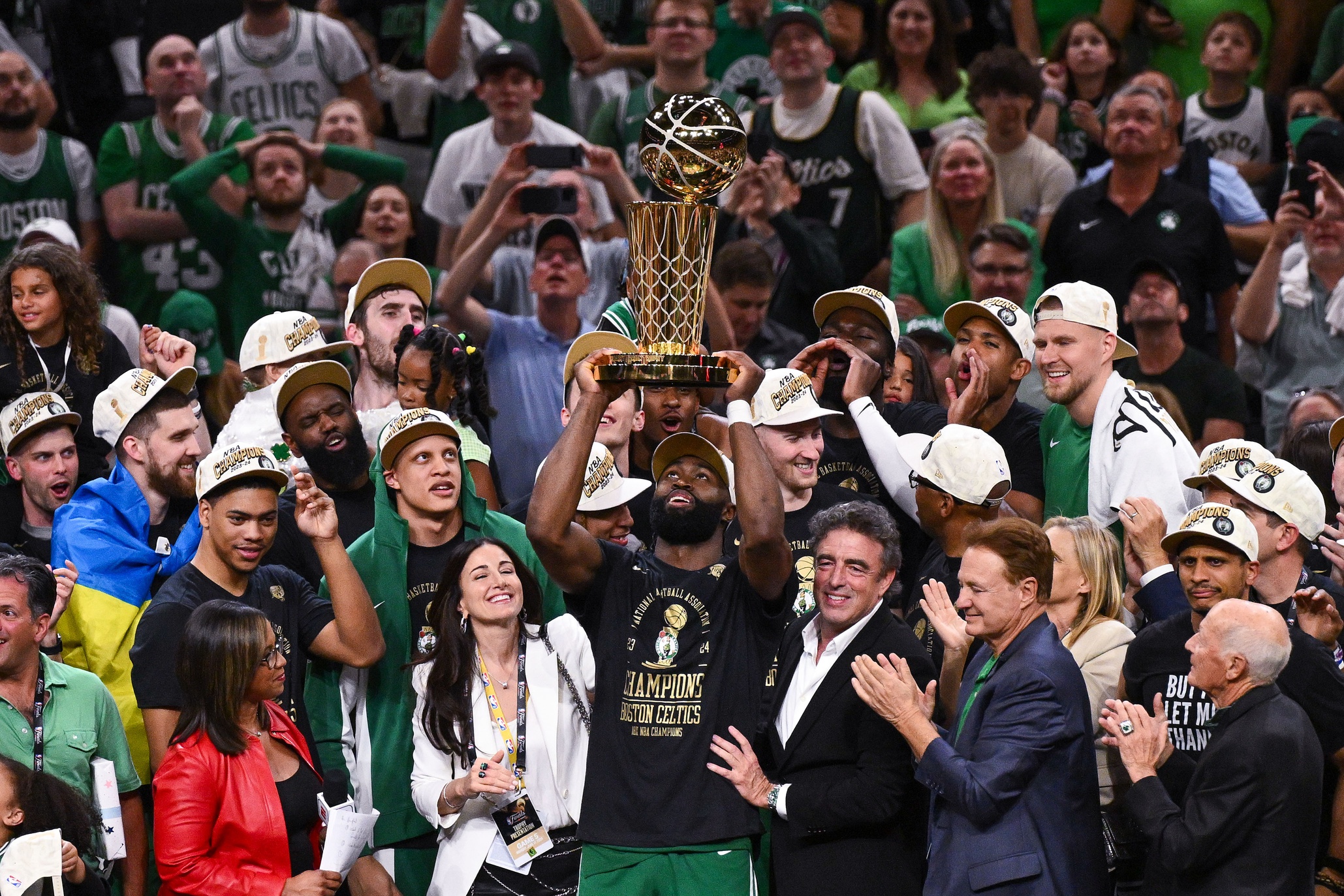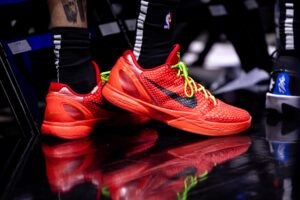On Monday night the Boston Celtics beat the Dallas Mavericks 106-88 to secure the NBA title and a record-breaking 18 NBA championships. The Celtics handled the Mavericks in five games and completed their dominant season. Notably, the Celtics had a 64-18 season record and only lost three games all playoffs. Let’s break down how the Celtics were able to win it all specifically focusing on what they did right in the finals.
NBA Finals: 4 Reasons Why The Celtics Won
Stifling Defense
The Celtics elite offense has been discussed a lot. However, many people forget how great their defense is. The finals should serve as a reminder and forever cement the greatness of the 2024 Celtics’ defense. Notably, Boston held the Mavericks to under 100 points in each win. The Celtics have five all-defensive caliber players which allows them to run a versatile switch-heavy scheme. This proved to be the perfect recipe against Luka Doncic and the Mavericks. Jaylen Brown played great individual defense against Luka holding him to 40 percent from the field and 25 percent from three. Jrue Holiday played lockdown defense on Kyrie Irving who on the series averaged 19.8 points on 41 percent from the field and 27 percent from three. Derrick White’s shot blocking and versatility were also crucial. As was Jayson Tatum’s size, rebounding, and versatility.
The Celtics’ switchable defensive scheme proved to be more challenging for Luka to score against as there were no mismatches while also limiting him as a playmaker by taking away his main lob threats. Luka averaged just 5.6 assists compared to his season average of 9.8. Furthermore, this scheme helped the Celtics limit the Mavericks’ corner threes on the season they averaged 11.3 attempts, but this number fell to 5.2 in the finals.
As a result role players P.J. Washington and Derrick Jones Jr. were far less effective. Washington averaged 10.8 while shooting 27 percent from three and Jones Jr. averaged 6.6 points on 25 percent shooting from beyond the arc. This was a significant departure from Washington’s 13.6 points and 36 percent from three as well as Jones Jr.’s 39 percent three-point shooting in the playoffs. Joe Mazzulla deserves credit for this defensive strategy and taking away crucial elements of the Mavericks’ defense.
Elite Balance and Offensive Optionality
The Celtics’ balance and plethora of offensive options made them stand out all season long. This proved to be a particular advantage against the Mavericks. Brown gave the Celtics elite-level production en route to winning Finals MVP averaging 20.8 points, 5.4 rebounds, and 5.0 assists. Brown had an amazing Game 3 where he put up 30 points, eight rebounds, and eight assists. Tatum made a well-rounded impact averaging 22.2 points, 7.8 rebounds, and 7.2 assists. While he struggled to score efficiently averaging 38.8 percent from the field and 26.3 from three his all-around contributions can not be understated. Tatum led the way in a closeout Game 5 with 31 points, 11 assists, and eight rebounds. Both players also attacked mismatches and pressured the rim consistently.
Holiday and Derrick White were able to take advantage of the defensive attention Tatum and Brown received by hitting 42.1 and 39.5 percent of their threes respectively. Additionally, both players had important offensive roles as initiators and connective playmakers. Holiday’s 26 points, and 11 rebounds in Game 2, and 15 points, and 11 rebounds in Game 5 were crucial. Ultimately both guards’ all-around play was a key reason the Celtics won and had so much success all year.
Al Horford’s presence as a floor-spacing big was also important and it perfected the Celtics five-out personnel. Horford shot a staggering 47 percent from beyond the arc. Despite the injuries early in the series Kristaps Porzingis was highly effective he gave the Celtics a vertical interior thereat and floor spacer. In Game 1 Porzingis had a 20-point outing and the Celtics offense looked impossible to game plan against. While he had a gutsy performance in Game 5 to clinch the championship it was clear Porzigis wasn’t fully healthy.
Ultimately, the Celtics’ offensive options, balanced scoring, and elite spacing worked to their advantage. Conversely, the Mavericks were very Luka-depended. He averaged 29 points in the series but needed more production from his teammates. This was particularly problematic considering Kyrie’s struggles throughout the series.
Furthermore, the Celtics’ previously mentioned defensive game plan hindered the Mavericks’ role players. Without having the shooting of Washington and Jones or consistent lob opportunities to Daniel Gafford and Dereck Lively the Mavs were a lost cause. This highlights a stark contrast between the two teams. All of the Celtics starting five can create shots from themselves and others. While the Mavericks’ role players can not so they solely rely on Luka and Kyrie for this.
Playoff Scars
It’s long been said before you win a championship you need to develop some playoff scars. The Celtics proved the value of playoff experience and learning from past years. With much of the same core, the Celtics have appeared in six of the last eight Eastern Conference Finals and lost to the Warriors in the 2022 NBA finals. The playoff experience and being so close to winning it all helped develop extreme resiliency, especially from Brown and Tatum.
It was clear all season long this group was solely focused on winning a championship. Adding Holiday, a proven winner and NBA champion helped give this core another level of experience. On the flip side, the Mavericks core is fairly new and didn’t have the same experiences together. Brown spoke about how previous playoff experiences prepared the Celtics for these big moments after Game 3. Ultimately the Celtics’ experience and composure stood out throughout the playoffs, especially in the finals.
Jaylen Brown: “All year long, we’ve been hearing about the Celtics of the past – for the last 6-8 months, all we’ve been hearing is about the shortcomings of the past. This is a new team. We learned from those experiences, and in these moments, you can see we didn’t run from it.” pic.twitter.com/Z1jLvZ6Un8
— Noa Dalzell 🏀 (@NoaDalzellNBA) June 13, 2024
Three Pointers and Ball Movement
Joe Mazzulla’s offense, often labeled Mazzulla ball, focuses on three-pointers and ball movement. This style of play was on display during the finals. Notably, in all four of the Celtics wins they made more three-pointers and shot a higher percentage from three while having more assists than the Mavericks. This was far from a shooting clinic from the Celtics as they only shot 33.8 percent from deep compared to the Mavericks 31.6 percent. However, the Celtics attempted 11 more threes per game despite the somewhat lower percentage this frequency helped them build and maintain leads. At some point, the three-point battle turned into a math equation and the Celtics had the clear upper hand in this regard.
Furthermore, the Celtics averaged eight more assists than the Mavericks on the series and had more assists than them in each of their wins. The Celtics also had over 60 more total passes which is a testament to their elite ball movement. All of the Celtics core played a part in this unselfish play. Tatum and Brown found their teammates for open looks when the defense pressured them. This improved playmaking has been the biggest area of growth for both the Jays. White and Holiday were vital as the connective guards running the offense. Horford was always there to make the extra pass.






